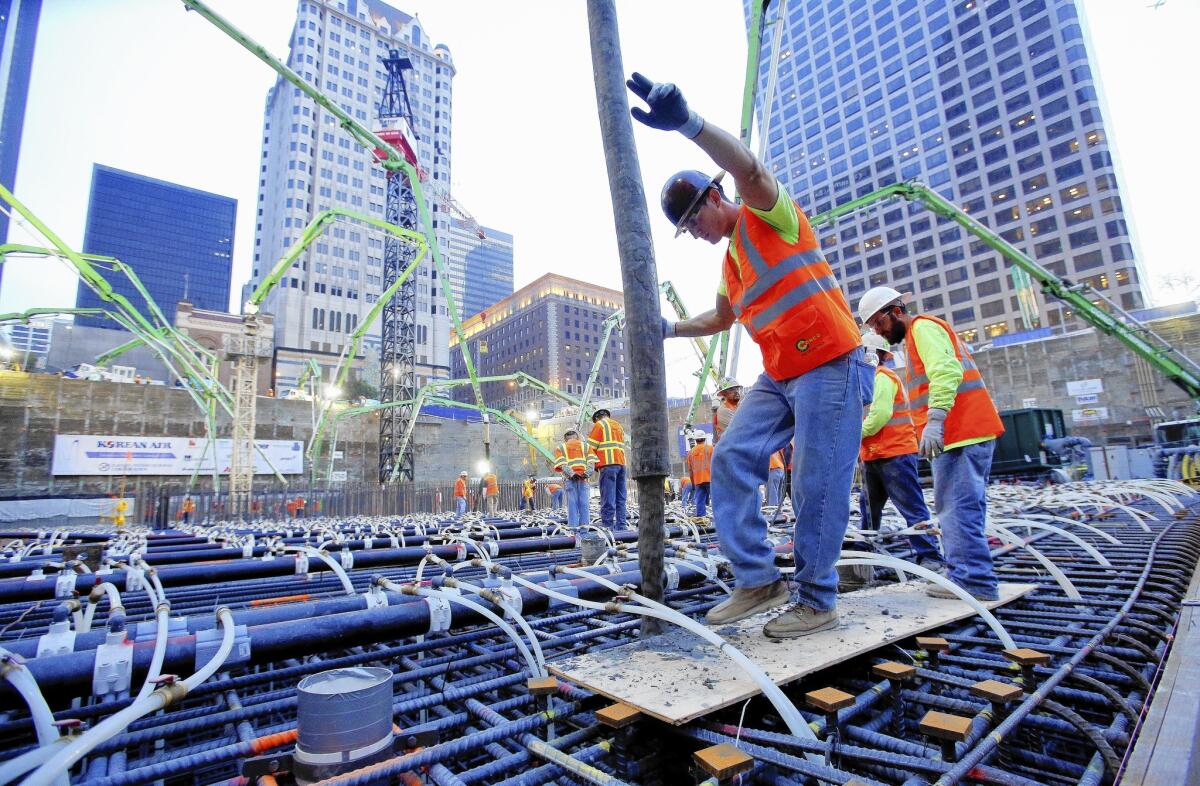L.A. considering financial assistance for hotel projects

- Share via
The Los Angeles City Council is looking at providing nearly $180 million in subsidies to two major downtown hotel projects, while also setting the stage for other hotel deals across the city.
The council’s Economic Development Committee will consider a plan to provide $138 million in assistance to the Frank Gehry-designed Grand Avenue project, which would bring housing, restaurants and a four-star hotel to a site across from Walt Disney Concert Hall. Under that plan, developer Related Cos. would keep the lion’s share of hotel tax revenue generated by the development until 2043.
Also before the panel is a proposed $39-million subsidy for Metropolis, a 19-story hotel and 38-story residential tower planned next to the 110 Freeway. City officials recommended that developer Greenland LA keep one-fourth of the taxes that would be generated for the city from that project over 25 years.
In addition to those two deals, the committee will vet a new policy to let hotel builders in other parts of the city keep a major share of the tax revenue generated by their projects, as long as they meet certain criteria. Those taxes normally flow to the city’s budget, helping to pay for police, fire and other services.
The policy would let owners of existing hotels near Los Angeles International Airport obtain subsidies if they carry out a major renovation of their facilities. And it would provide additional money to new hotel projects built in special zones, such as downtown, Hollywood, North Hollywood and a section of the east San Fernando Valley near Bob Hope Airport.
Backers of the new policy say L.A. lags behind other major cities in hotel development, limiting its ability to attract major conventions and boost tourism overall.
Councilman Curren Price, who heads the committee, said the policy also would create more certainty for hotel developers, letting them know how many rooms they need to construct in a particular neighborhood to qualify for city help.
Each company that seeks the money will be required to pay for a study to show that it has a gap in its financing, he said.
“It’s not going to be an automatic piggy bank; they’re going to have to prove it,” Price said.
The proposed hotel policy comes as Price and some of his colleagues are pushing a separate proposal to hike minimum wages for the city’s nonunion hotel workers to $15 an hour. Business groups have been fighting that proposal, which is expected to come up for a vote later this year.
Los Angeles has already committed more than $500 million for three downtown hotel projects — the Wilshire Grand, L.A. Live and a Marriott hotel tower across the street from L.A. Live. In each case, tax revenue that would have gone to the city’s budget will instead be kept by the developers over a 25-year period.
Critics question whether the city drives a hard enough bargain — or is in a position to be forfeiting a share of the hotel taxes, sales taxes and other forms of revenue generated by new hotels.
“When your bank account’s empty, you don’t give away money,” said Mike Eveloff, president of the advocacy group Fix the City, which has sued Los Angeles for purportedly failing to monitor maintenance of streets, sidewalks and other infrastructure.
City officials say those previous projects would not have been built, or generated any tax revenue, had the city not provided financial help. Even after the subsidies are factored in, the Grand Avenue and Metropolis projects will send more than $378 million to the city budget over the next three decades, said Sharon Tso, executive officer for the city’s chief legislative analyst.
Business leaders offered a mixed reaction to the hotel proposal. Carol Schatz, the top executive at the downtown-based Central City Assn., favored parts of the policy but criticized a section that requires hotels near the Convention Center to construct a minimum of 450 rooms to qualify for assistance.
Schatz said she was also alarmed that any hotel provided with taxpayer help would have to agree to “card check neutrality” — a process favored by labor leaders for helping workers organize into unions. That provision, she said, would be “a benefit for a special interest.”
“There are reasons a hotel might not want to unionize, like work rules,” she said. “This basically forces the issue and pretty much gives labor the opportunity to organize with no checks and balances.”
Follow @DavidZahniser for news about City Hall government and politics.
More to Read
Sign up for Essential California
The most important California stories and recommendations in your inbox every morning.
You may occasionally receive promotional content from the Los Angeles Times.











